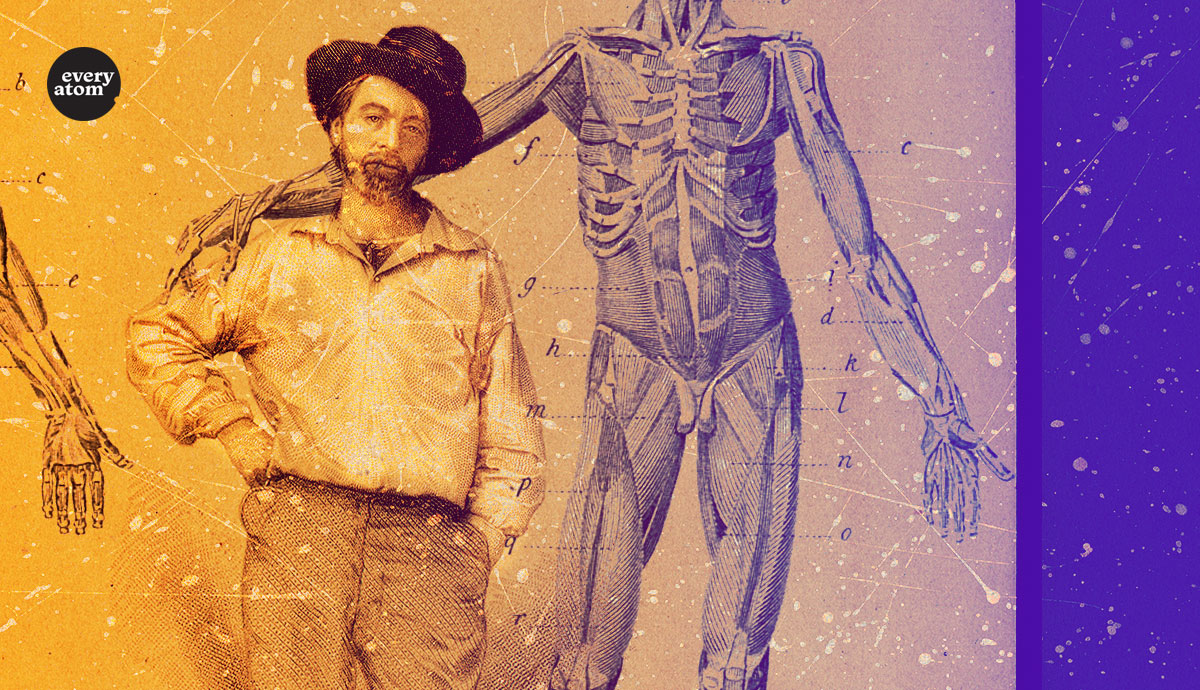Every Atom | No. 121
Introduction to Every Atom by project curator Brian Clements
In the 1855 edition of Leaves of Grass, Whitman sought to revive the real value of the human and natural world through a pervasive and often comic practice of poetic catachresis, a purposeful misnaming as a means of recomposing by decomposing the nature of things. His long opening poem (later “Song of Myself”) begins with a catachrestic renaming: “I celebrate myself.” Whitman wrenches the word celebrate from its conventional religious and public ceremonial usage to describe the unleashing—or birthday—of the fullness and plenitude of the person, myself and the self in relation, that he embodies and seeks to call forth. “Divine am I inside and out, and I make holy whatever I touch or am touched from,” Whitman declares, turning the language of scripture and religious creed to a celebration of the glories of the person and the body: “The scent of these arm-pits is aroma finer than prayer, / This head is more than churches or bibles or creeds.” To redeem the body, sex, and nature from their former abjection, Whitman presents a nonsupernatural account of God and soul by redirecting the language of religious worship to the miracle of the spirit in the flesh: “If I worship any particular thing it shall be some of the spread of my own body,” he writes in a ritual of nature and body worship that decorously includes, by encoding as nature, the semen and genitals: “You my rich blood, your milky stream of pale strippings of my life / …. Root of washed sweet-flag, timorous pond-snipe, nest of guarded duplicate eggs, it shall be you.”
Through a similar poetics of catachrestic renaming the poet invents a counter-ethics and metaphysics of love that locates God and soul within the individual person and the social being of the person in affectionate and loving relation with the other and the world. The poet finds God not through the institutional medium of Church or clergy, but in his bedroom as comrade and lover: “As God comes a loving bedfellow and sleeps at my side all night and close on the peep of day, / And leaves for me baskets covered with white towels bulging the house with their plenty.” He enacts his relation to nature in the language of a passionate love affair that makes it unclear whether he is describing nature or an actual or fantasy lover:
Prodigal! You have given me love! . . . . therefore I to you give love!
O unspeakable passionate love!
Thruster holding me tight and that I hold tight!
We hurt each other as the bridegroom and the bride hurt each other.
Here as elsewhere in Leaves of Grass, Whitman’s revolutionary experiments in the language and style of poetry, his seemingly inappropriate but in fact catachrestic mixture of genres, voices, and tones—of lyric, epic, comedy, and satire, of comrade, mystic, teacher, and rough, of confession, intimacy, hyperbole, and brag—are at the very sources of his poetic practice as a practice of democracy.
Recommended
Nor’easter
Post-Op Appointment With My Father
Cedar Valley Youth Poet Laureate | Fall 2024 Workshop







